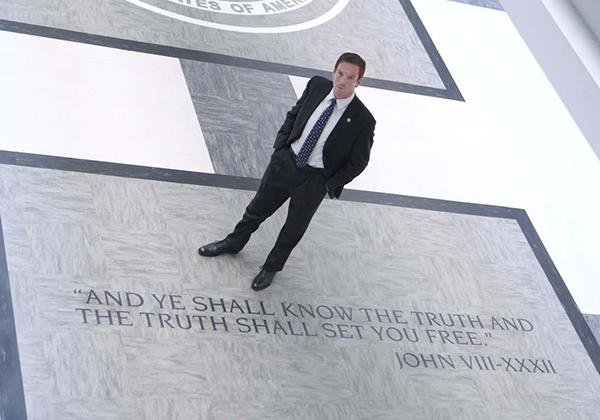
Damian Lewis as Nicholas “Nick” Brody in Homeland (Season 2, Episode 1).
Photo courtesy of Kent Smith/SHOWTIME
(ARTICLE ORIGINALLY PUBLISHED MARCH 20, 2013 ON MEDILL REPORTS CHICAGO)
Whether it is Orson Welles’ radio rendition of “The War of the Worlds” or the laughable antics of Maxwell Smart in the 1960s TV series “Get Smart,” Americans’ obsession with the national security and spy genre has a long history in the entertainment business.
Now more than ever, however, films like “Zero Dark Thirty” and the Showtime hit “Homeland,” seem to have struck a particular chord with American audiences. The fascination with top secret government missions and getting a peak behind the scenes is what draws in so many viewers, experts said.
“It’s a combination of knowing it’s some truth and the unknown of the truth, that gives the thrill in watching shows like ‘Homeland,’” said Adrienne Mazzone, executive vice president of TransMedia Group, a Florida public relations firm that works in arts and entertainment.
Mazzone says while we rely on information the media reports, the media is not always privy to the full story. Viewing shows like “Homeland” makes people think they are getting a fuller picture of what the government is not sharing, she said.
Walter Podrazik, an adjunct lecturer in the University of Illinois at Chicago’s communications department, agrees.
Podrazik, who also authored a series of books on media history with a specialization in TV, said that the American obsession with reality TV plays a role in this trend. This sense of voyeurism creates a desire to go behind the scenes and see what is behind the public face.
“The aftermath of 9/11 and the wars in Afghanistan and Iraq have been around for a while now. In a way this storytelling is this generation owning and dealing with this war,” said Podrazik. “This is not already in the pages of the history book, this is now – this is them. There are many stories to tell. What does it all mean? If it’s worth it, why is it worth it? If it isn’t, why? There is a captivating draw.”
On top of real-life security concerns, Americans are also drawn to implausible and somewhat apocalyptic security breaches. AMC’s “The Walking Dead,” a series about a police officer leading a group of survivors in a world overrun by zombies brings in millions of viewers on a weekly basis.
While popular media based on historical events takes liberties, it is common for producers to seek the CIA’s and FBI’s input. CIA spokeswoman Jennifer Youngblood said
For example, “Zero Dark Thirty,” drew early controversy because of its enhanced portrayal of torture by the CIA, which critics have called “disturbing” and “misleading.”
“Over the years, CIA has engaged with writers, documentary filmmakers, movie and TV producers, and others in the entertainment industry,” said CIA spokeswoman Jennifer said the CIA’s priority is to “protect sources and methods” and “debunk myths about the Agency” by answering writers’ questions.
“Our goal is an informed and balanced portrayal of the men and women of the CIA, their vital mission, and the commitment to public service that defines them,” said Youngblood. “The protection of national security equities is always paramount in any engagement with the entertainment industry.
FBI Public Affairs Specialist Beth Lefebvre said that while the FBI is open to providing guidance to TV and film producers, the decision of how to portray the FBI is in their hands.
“While the FBI in some cases does assist producers, many of these productions are works of fiction and for entertainment purposes – writers and producers can choose how they ultimately portray their characters or the plot line and how accurately they want to depict the FBI in the storyline,” Lefebvre said.
The U.S. has been involved in wars and international conflicts for much of its almost 237-year history. But nothing in recent history has instilled as much fear and fascination as the terrorist attacks spearheaded by al–Qaida and its leader, Osama bin Laden.
Podrazik points out that recent films and TV shows portraying 9/11 and the wars in Afghanistan and Iraq differ from the Vietnam War-era productions. He says that the Vietnam War was so wrapped in controversy that it was hard to talk about it at that time. Therefore, the outcome was “surrogate criticisms” depicted by TV shows and films.
He believes we have since learned from the Vietnam experience. “Before we avoided it. Now we want to take it head on,” Podrazik said.
Columbia Pictures’ film “Zero Dark Thirty,” a dramatization of the real-life mission to assassinate Osama bin Laden, was No. 1 the weekend of its nationwide release, bringing in $24.4 million in ticket sales. Through today, domestic box office sales total $95.3 million.






